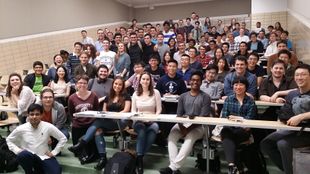1617-257/Homework Assignment 2 Solutions: Difference between revisions
(Created page with "{{1617-257/Navigation}} ==Student Solutions== '''Solve''' problems 1a<u>b</u>, 2, 3, 4a<u>b</u> in section 4, but submit only the underlined problems/parts. In addition, solv...") |
|||
| Line 1: | Line 1: | ||
{{1617-257/Navigation}} |
{{1617-257/Navigation}} |
||
==Doing== |
|||
| ⚫ | |||
'''Solve''' problems 1a<u>b</u>, 2, 3, 4a<u>b</u> in section 4, but submit only the underlined problems/parts. In addition, solve the following problems, though submit only your solutions of problems A and B: |
'''Solve''' problems 1a<u>b</u>, 2, 3, 4a<u>b</u> in section 4, but submit only the underlined problems/parts. In addition, solve the following problems, though submit only your solutions of problems A and B: |
||
| Line 12: | Line 12: | ||
'''Problem D.''' The ''Cantor set'' <math>C</math> is the set formed from the closed unit interval <math>[0,1]</math> by removing its open middle third <math>(\frac13,\frac23)</math>, then removing the open middle thirds of the remaining two pieces (namely then removing <math>(\frac19,\frac29)</math> and <math>(\frac79,\frac89)</math>), then removing the open middle thirds of the remaining 4 pieces, and so on. Prove that <math>C</math> is uncountable, compact and totally disconnected (the last property means "the only non-empty connected subsets of <math>C</math> are single points"). |
'''Problem D.''' The ''Cantor set'' <math>C</math> is the set formed from the closed unit interval <math>[0,1]</math> by removing its open middle third <math>(\frac13,\frac23)</math>, then removing the open middle thirds of the remaining two pieces (namely then removing <math>(\frac19,\frac29)</math> and <math>(\frac79,\frac89)</math>), then removing the open middle thirds of the remaining 4 pieces, and so on. Prove that <math>C</math> is uncountable, compact and totally disconnected (the last property means "the only non-empty connected subsets of <math>C</math> are single points"). |
||
| ⚫ | |||
[[Media:1617-257_homework2_solutions.pdf|Student 1]] |
|||
Student 2: |
|||
Latest revision as of 15:50, 25 November 2016
Doing
Solve problems 1ab, 2, 3, 4ab in section 4, but submit only the underlined problems/parts. In addition, solve the following problems, though submit only your solutions of problems A and B:
Problem A. Let [math]\displaystyle{ (X,d) }[/math] be a metric space. Prove that the metric itself, regarded as a function [math]\displaystyle{ d\colon X\times X\to{\mathbb R} }[/math], is continuous.
Problem B. Let [math]\displaystyle{ A }[/math] be a subset of a metric space [math]\displaystyle{ (X,d) }[/math]. Show that the distance function to [math]\displaystyle{ A }[/math], defined by [math]\displaystyle{ d(x,A):=\inf_{y\in A}d(x,y) }[/math], is a continuous function and that [math]\displaystyle{ d(x,A)=0 }[/math] iff [math]\displaystyle{ x\in\bar{A} }[/math].
Problem C. Prove the "Lebesgue number lemma": If [math]\displaystyle{ {\mathcal U}=\{U_\alpha\} }[/math] is an open cover of a compact space [math]\displaystyle{ (X,d) }[/math], then there exists an [math]\displaystyle{ \epsilon\gt 0 }[/math] (called "the Lebesgue number of [math]\displaystyle{ {\mathcal U} }[/math], such that every open ball of radius [math]\displaystyle{ \epsilon }[/math] in [math]\displaystyle{ X }[/math] is contained in one of the [math]\displaystyle{ U_\alpha }[/math]'s.
Problem D. The Cantor set [math]\displaystyle{ C }[/math] is the set formed from the closed unit interval [math]\displaystyle{ [0,1] }[/math] by removing its open middle third [math]\displaystyle{ (\frac13,\frac23) }[/math], then removing the open middle thirds of the remaining two pieces (namely then removing [math]\displaystyle{ (\frac19,\frac29) }[/math] and [math]\displaystyle{ (\frac79,\frac89) }[/math]), then removing the open middle thirds of the remaining 4 pieces, and so on. Prove that [math]\displaystyle{ C }[/math] is uncountable, compact and totally disconnected (the last property means "the only non-empty connected subsets of [math]\displaystyle{ C }[/math] are single points").
